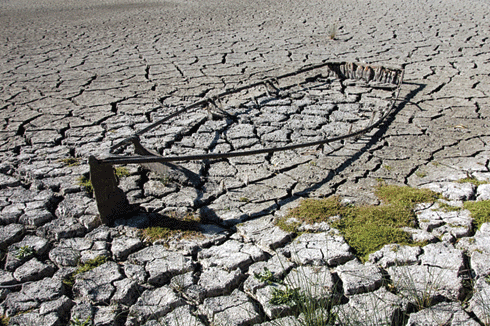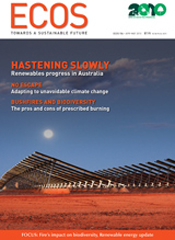
|
Published:
Cautious support for new Basin Plan, but scientists urge big-picture view
A group of more than 30 of Australia’s leading freshwater scientists have issued a public reminder to the Federal Government that its Murray–Darling Basin Plan – due for release in 2011 – represents a once-in-a-lifetime opportunity to restore the ailing river system.

|
|
Skeleton of an old boat stuck fast in the bed of a dried-out lagoon on a station property near the River Murray at Big Bend, SA. Credit: Greg Rinder. CSIRO
|
‘We really have to get this right,’ says group spokesperson, Professor Richard Kingsford, Director of the Australian Wetlands and Rivers Centre, University of NSW. ‘We owe it to the Australian people and to the Basin’s environment.’
The signatories to the statement, representing Australia’s top experts in the field, expressed cautious support for the draft Basin Plan to be released by the Federal Government in the next few months.
They note that the plan will provide the overarching direction for managing the Basin’s rivers and provide for sustainable levels of water diversion. This will be done by identifying key environmental assets and determining their water needs.
But the scientists identify nine points they believe need to be addressed for the plan to fulfil its potential. These include an acknowledgement that the system cannot be seen as a series of isolated sites for management of water. ‘Rivers and their floodplains are ecosystems connected by flow,’ says Adjunct Associate Professor Keith Walker of the School of Earth and Environmental Sciences at the University of Adelaide. ‘Flowing water transports sediment, salt and nutrients, and connects the habitats of all plant and animals. Without adequate flow, the system would collapse.’
The scientists note that many of the Basin’s rivers have continued to degrade because of over-allocation and drought. This is especially true of the wetlands protected by international conventions such as the international Ramsar Convention. ‘Australia has international responsibilities for maintaining the ecological character of the Ramsar wetlands in the Basin, yet most of them are in decline,’ says Professor Max Finlayson, Director of the Institute for Land, Water and Society (ILWS) at Charles Sturt University. ‘The Basin Plan is a significant opportunity to tackle this major issue and reverse the neglect of the past.’
Over-allocation through the management of diversion limits will be one of the more critical issues to be addressed. ‘We know the rivers are considerably over-allocated, so further limits on diversions are essential,’ says Professor Kingsford. ‘But these can be delivered in many ways, such as sustainable diversion limits, end-of-system targets and management of low flows.’
The statement calls for common terminology that transcends State borders and allows people to better understand how the Basin’s water is managed.
It also argues that it is critical to review and record uncertainties involved in the development of the Basin Plan, not only because developing such a major undertaking needs to be done quickly but also to enable the assumptions and calculations underpinning its findings on hydrology, ecology and socioeconomics to be revised in the light of new knowledge in the future.
The scientists acknowledge that the plan will not be able to manage all aspects of rivers, since external factors such as levee banks and agricultural practices can affect floodplain flows and water quality.
In the longer term, the scientists would like to see governments across Australia invest in future leaders through boosting scholarship, and teaching and research programs.
‘There has never been a time when water has been more important as an issue for society and the environment,’ says Professor Kingsford. ‘We need to be constantly learning and thinking about innovative ways of managing our rivers and our future generations need a leg-up to make this happen.’
More information:
Murray–Darling Basin Authority, Basin Plan,
www.mdba.gov.au/basin_plan



